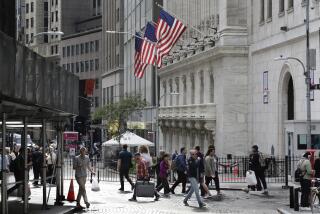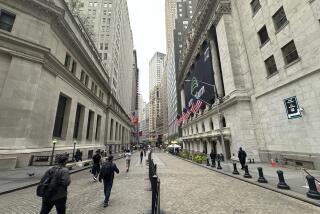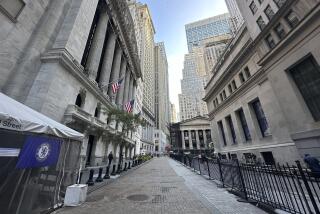FINANCIAL MARKETS : STOCKS : War Concerns Loom Heavily; Dow Off 7.18
- Share via
Stocks closed mixed Thursday as wary investors postured for the heightened possibility of a Gulf ground war.
Trading was completed before the Soviet Union made the dramatic announcement that Iraq had agreed that it was possible to pull out of Kuwait.
The Dow Jones average of 30 industrials dropped 7.18 points to 2,891.83, bringing its loss during the past three sessions to 42.82.
However, many broader indexes were higher Thursday. And in nationwide trading of New York Stock Exchange-listed stocks, 834 issues rose, 715 declined and 505 issues were unchanged. Big Board volume continued to ease, falling to 180.77 million shares, down from Wednesday’s 185.68 million.
Caution prevailed on Wall Street after the news early in the day that Saddam Hussein had vowed that his armed forces would continue fighting. The Iraqi leader predicted that the war was heading to the “mother of all battles.”
Traders said Hussein’s remarks caused prices to seesaw.
“People were looking for the extreme--either peace or the start of a ground war,” said David Chao, a trader at County NatWest.
The market paid scant attention to Federal Reserve Chairman Alan Greenspan’s ongoing congressional testimony, analysts said. “Most people have been focusing on the political and military news rather than economic news,” said Tom Callahan, executive vice president at Yamaichi International.
Among the market highlights:
* The Dow was squeezed by two extremes: Philip Morris jumped 2 1/8 to 66 1/4 after the company raised its five-year free cash flow projection to $18 billion from $15 billion. Goldman Sachs raised its 1991 and 1992 earnings estimates on the company.
Meanwhile, IBM tumbled 2 3/8 to 135 1/2 on profit-taking. Philip Morris and IBM are two of the most influential stocks in the Dow 30.
* Industrial stocks as a group continued to move lower, as more investors began to fear that the recession won’t end soon. Caterpillar lost 7/8 to 49 3/4 after saying poor demand for its equipment could result in a first-quarter loss. Georgia-Pacific dropped 2 1/8 to 44 7/8 after Smith Barney cut its 1991 earnings estimate.
But Clark Equipment inched up 1/8 to 29 despite saying it will report a first-quarter loss, due largely to one-time charges.
* Casino and hotel stocks were mostly strong. Golden Nugget jumped 2 1/4 to 26 1/8 on a strong 1990 earnings report--even though the company also said it expects lower earnings this year because of falling tourism. Caesars World rose 3/4 to 17 3/4 and Hilton gained 1 5/8 to 45.
* Woodland Hills-based insurer Twentieth Century Industries rocketed 4 1/4 to 34 3/4 after reporting higher-than-expected fourth-quarter earnings. Also gaining was insurer Mercury General, up 2 1/4 to 30 1/4 despite lower quarterly results.
* Thousand Oaks-based Amgen soared 6 3/4 to 95 1/2, an all-time high, after the biotech company received slightly quicker than expected approval to sell a genetically engineered drug to treat chemotherapy patients. The news sparked yet another rally in other biotech stocks, including Immunex, up 4 1/4 to 40 1/2, Genetics Institute, up 2 3/4 to 56 1/4, and Centocor, up 1 1/2 to 61 3/4.
* Among smaller Southland stocks, radio firm Westwood One rose 1/4 to 2 6/16 on its earnings report. Computer lessor Amplicon rose 1 1/4 to 12 3/4, and personal-computer maker Tandon jumped 13/32 to 3 14/32.
In London, share prices rose, showing little reaction to Hussein’s speech. The Financial Times 100-share index ended 15.6 points higher at 2,312.4.
German share prices were mostly lower as trading stagnated in virtually every sector except autos. The 30-share DAX index ended just one point lower at 1,566.32.
In Tokyo, stocks closed lower on widespread caution, as major investors took to the sidelines amid Gulf War jitters and fears that the market was due for a further downward correction. The Nikkei 225 index fell 174.42 points to 26,024.37.
In midday trading today the Nikkei was off 88.58 points, after rising more than 200 points in early trading on hopes for Gulf peace.
Credit
Saddam Hussein’s strident speech sent bond prices lower, with traders fearing that a full-scale ground war was imminent.
The Treasury’s bellwether 30-year bond fell 1/4 point, or $2.50 per $1,000 in face amount. Its yield climbed to 8.06% from 8.03% late Wednesday.
In morning trading, bond prices were up as much as 1/2 point on signs of lower inflation and hints of further interest-rate easing by the Federal Reserve. But traders sold positions during Hussein’s 40-minute address on Baghdad Radio, during which he declared that Iraq was ready to fight a ground war if President Bush continued to reject his peace efforts.
Today, however, the prospects of peace under the Soviet Union’s initiative could bring buyers back to bonds, analysts say. Short-term interest rates have fallen so low that many investors appear eager to move into longer-term bonds, with the right incentive.
The federal funds rate, the interest on overnight loans between banks, was 6.675%, up from late Wednesday’s 2%. Wednesday’s low rate was because of technical factors stemming from banks’ reporting period for meeting reserve requirements.
Currency
The dollar declined in New York as a ground offensive against Iraq appeared probable.
Early today in overseas trading, the dollar rallied on news of tentative Iraqi acceptance of the Soviet Union’s peace plan. But the rally didn’t hold.
The dollar jumped to 131.50 yen in Far East trading early today when news of the plan broke, but it fell back to 131.03 yen by midday.
The dollar had closed at 131.43 yen in New York, down from 131.27 Wednesday. It closed at 1.492 German marks, down from 1.495.
New York trading was influenced by Fed Chairman Alan Greenspan’s testimony on Capitol Hill, in which he indicated that the credit crunch is continuing. The market interpreted that as a sign that “more Fed easing is likely,” said Marc Chandler, analyst with the firm IDEA.
A move by the Fed to ease credit by lowering interest rates generally hurts the dollar because it makes dollar-denominated securities less valuable for investors.
Commodities
Hog and pork belly futures prices collapsed, tumbling their permitted daily limits amid perceptions that a seasonal increase in slaughter rates has begun.
On other commodity markets, cattle futures were mixed; oil futures fell sharply; precious metals were lower, and grains and soybeans were mixed.
Live hog futures settled 0.3 cent to the permitted daily limit of 1.5 cents lower on the Chicago Mercantile Exchange, with the expiring contract for delivery in February down 1.5 cents at 50.35 cents a pound; frozen pork bellies finished 1 cent to the 2-cent limit lower, with February at 63.07 cents a pound.
In cattle trading, live cattle futures were unchanged to 0.98 cent higher, with expiring February at 80.6 cents a pound; feeder cattle were unchanged to 0.15 cent lower, with March at 88.92 cents a pound.
The plunge in pork followed Wednesday’s moderate decline. Analysts said much of the selling was driven by an increase in the number of hogs offered to meatpackers and a corresponding drop in the prices at which they were sold.
Hog marketings typically rise in late winter, a function of the industry’s breeding cycle, analysts said.
Thomas Morgan, president of Sterling Research Corp. in Arlington Heights, Ill., said cash hogs prices were 50 cents to $1 a pound lower Thursday than Wednesday.
“We’re in a period of time when the market normally erodes,” he said.
Precious metals also fell on New York’s Commodity Exchange, following the oil markets.
Gold futures ended $1.90 to $2 lower, with February at $362.70 an ounce; silver was 3.3 to 3.7 cents lower, with March at $3.64.
Market Roundup, D6
More to Read
Inside the business of entertainment
The Wide Shot brings you news, analysis and insights on everything from streaming wars to production — and what it all means for the future.
You may occasionally receive promotional content from the Los Angeles Times.










